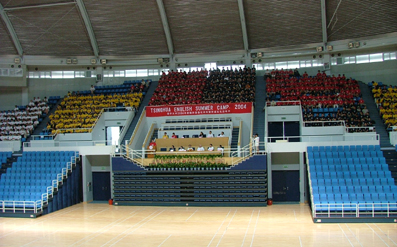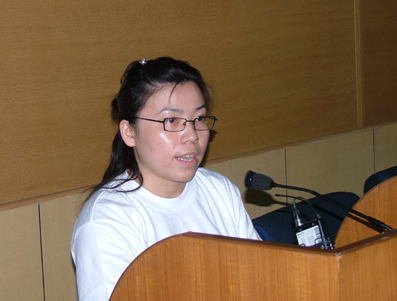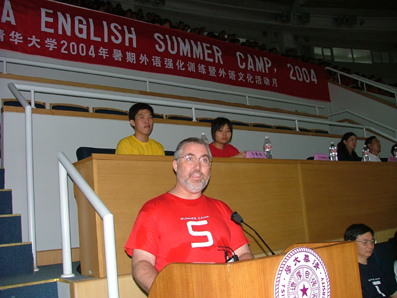——2004 English Summer Camp, Tsinghua University

From July 26 to August 20 in the year of 2004, some 3300 Tsinghua freshmen will experience a whole new way of learning English. Special time, designated places, experienced teachers combine to make a unique Summer Camp for nearly 3300 students. All this proves to be unprecedented in the 93 long history of Tsinghua University. In the following four weeks, there will be four different themes, various English lectures, and all kinds of interesting competition and performance----it is indeed a challenge to the traditional way of English teaching. English learning activity of this large scale takes the lead among so many Chinese colleges and universities. Furthermore, as one foreign professor from the Foreign Languages Department remarks, “it is so rare an event in the world, especially in non-English speaking countries.” All in all, in the field of foreign language teaching both at home and abroad, every part of this Summer Camp is “unprecedented”.
Brand new form of organization: from administration classes to eight phalanxes
Traditional English teaching divides students into small classes according to their language proficiency, which are called teaching classes. However, this program breaks the used-to-be level-dividing way of learning a language, instead, they form classes in accordance with their administration class, that is, the language proficiency of students is not considered. When talking about this innovation, the dean of Foreign Languages Department emphasizes: “ this way of dividing students might be risky, as a result the decision is not easily made, it takes several discussion before we make up our mind. In this way, we hope the students wouldn’t feel inferior to others while learning, and the motivation of learning is from within. What’s more, it’s easier to find appropriate topics, for a number of reasons.” In order to make this program run more smoothly, all the students, around 3300 in total, are classified into eight phalanxes, each of which is subdivided into 4 teams which are distinguished by the color of the T-shirts they wear, namely, red, white, purple and blue. So altogether there will be 32 teams, and each team will have about 100 people. These 100 teams are subdivided again, roughly 3 or 4 groups in each team, which is the small classes students normally have everyday.

Unique way of teaching: the incorporation of topic-centered activities
Besides, the teaching form of this program adopts the combination of face-to-face teaching, activities and extracurricular study. One theme will be chosen in each of the following four weeks. The first week is about mass media and the art of advertisements; the second week is about Olympic Games, which is followed by music and culture week, and the last week is devoted to other hot topics. All teaching activities will focus on these topics. For instance, when the week of Olympic Games is going on, students learn the origin of the Games, the geographic and cultural features of those past Olympic host countries, the spirits of Olympic Games, famous athletes and so on.
For each week, ten hours would be assigned to face-to-face teaching, in which listening and oral English have four hours respectively, the left two writing class. All these courses are designed for practical use, to enhance students’ ability of communication in speaking and writing.
These activities put great emphasis on the language practice and participation of students. They include reading aloud, speech contest, debating, English songs, movie dialogue and play acting, on which eight hours per week will be spent, and every student will get involved. To stimulate their desire to learn, related competitions are held. The final competition would be attended by representatives from 32 teams and the venue for that event would be the gymnasium.
From Monday evening to Tuesday evening, lectures, English movies, English corners and English contests are held every night at the same time. During this period, Nobel Prize Winner, Prof. Yang Zhenning, foreign minister Mr. Li Zhaoxing and famous athlete Ms. Deng Yaping as well as experienced foreign teachers will give excellent lectures to all students.
Extracurricular learning utilizes computer-based software to sharp the listening and speaking skills of participants. The rules require each student to study through computer twenty hours per week, two more hours for assisted study. The software in use is “interacting learning system” from Tsinghua University Press, which offers necessary practice and training within the local network. Special places will be provided in the computer lab for that purpose.
Competent faulty: more than 100 teachers home and abroad
The plan of this program was put forward last October, and the preparation work started officially last December after detailed discussion. The most important part of the work would be teachers. Prof. Luo Lisheng, Dean of Foreign Languages Department, tells our correspondent that almost all faulty of the department are involved, and master students as well. What’s more, more than seventy foreign teachers or volunteers have traveled thousand miles to take part in this event. In order to interview those applicants, some foreign teachers from the Foreign Languages Department even flied back home at their own expense during the winter vocation. Sherman Day, former president of Georgia State University and member of the Atlantic Olympic Committee encourages his daughter to join this program, and Mr. Gary Howlett does a great amount of planning work.
This program runs according to the administration class, but face-to-face teaching and language activities are going on separately. In principle, one foreign teacher, one Chinese teacher, one foreign volunteers and one master student are assigned to one team of about 100 students. It’s required that beyond the 12-hour regular class per week, teachers should stay with their students for an extra 10 hours, which is used for answering questions from students and giving advice. English volunteers and master students work as teaching assistants, whose major task is to make sure that students have access to the internet, give advice if needed and check the homework.
In teaching building 6, only English language is allowed

Language environment is a very important element to language learning. The 6th teaching building is the largest one in scale, equipped with the most advanced facilities, for example, multimedia and AC. Now the school authority has made it only for the use of the program. Only English language is allowed in this building. Prof. Luo stresses that this program is to create the language environment, like English corner, debating, speech contest and vocabulary competition.
United and assisted
This program has received lots of help from various departments in the university since the day it’s initiated. A small problem may lead to the corruption of the whole program. Since this program is held in summer vocation, which forces logistics staff to give up their precious vocation to ensure that food and bathing problem is properly solved. As the leading force of management, the administration section contributes substantially to the smooth running of the whole program and solves problems that are urgent to students. Outside the campus, Tongfang Company, FLP among others sponsor this program in different ways.
We all hope that this program will turn out a great success.
Reported by Gu Shuxia
Photoed by Wei Lei

